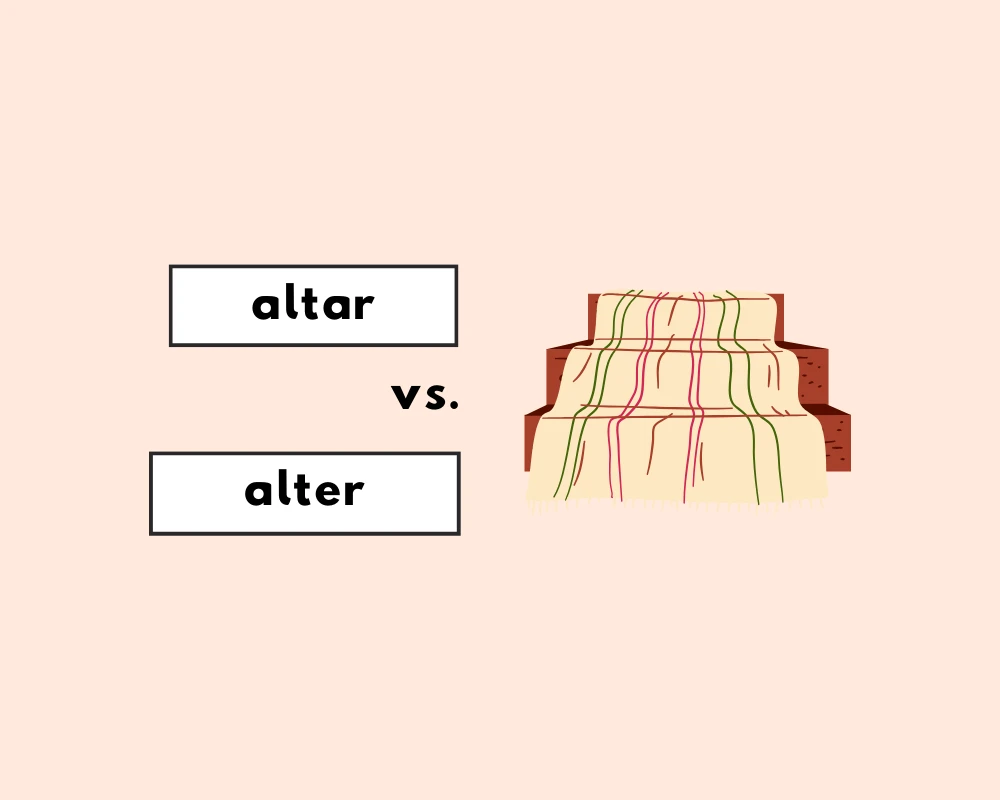Alter vs. altar
Alter and altar sound nearly the same, and are only a single letter apart. Still, they are not the same. Both words belong to separate parts of speech, and are unrelated in meaning. And so should be used accordingly:
Please alter the document to reflect the changes.
The priest stood before the altar.
They will altar the plans for the altar.
He made changes to the alter.
- Alter is a verb that means to change or modify something.
- Altar is a noun that refers to “a structure with a flat top, often shaped like a table, that is used in some religious ceremonies”.
“Alter” / “altar”, used in sentences
| Examples: “alter”, used in sentences |
|---|
| Prices did not alter significantly during 2019.
He had altered so much I scarcely recognized him. The landscape has been radically altered by changes in the climate. He has the power to fundamentally alter the course of history. |
| Examples: “altar”, used in sentences |
|---|
| He built an altar to God and made a sacrifice.
He placed the candles on the altar. Helen and Tony kneeled at the altar. The bride approached the altar. |
Altar, synonyms
- assembly
- board
- church table
- pedestal
- shrine
“alter” (verb, to change) vs. “altar” (noun, religious structure), associate “alter” with “alteration” (a change) and visualize a priest standing *before* the “altar.”.
Alter, synonyms
- adjust
- amend
- change
- develop
- modify
- reshape
- revamp
- revise
- shift
- transform
- vary
Word origin (of altar/alter)
|
late 14c., “to change (something), make different in some way,” from Old French alterer “to change, alter,” from Medieval Latin alterare “to change,” from Latin alter “the other (of the two)”. |
Old English alter, altar “altar,” from Latin altare (plural altaria) “high altar, altar for sacrifice to the great gods,” perhaps originally meaning “burnt offerings”.
Read about other misused words
Worksheet
Based on the post, what is the meaning of the word “alter”?
What part of speech is the word “alter”?
Based on the post, what does the word “altar” refer to?
What part of speech is the word “altar”?
Which of the following sentences uses the word “altar” incorrectly based on the post?
We need to the document to include the new information.
She placed the flowers reverently on the .
Significant events can the course of history.
The congregation gathered around the for the ceremony.
He found it difficult to his routine after moving.
FAQs
How are ‘alter’ & ‘altar’ different?
+
What does the word “alter” mean?
+
What does the word “altar” mean?
+
What part of speech is “alter”?
+
Can ‘altar’ be used like ‘alter’?
+
Yash, D. "Alter vs. Altar (Definition, with Examples)." Grammarflex, Jun 25, 2025, https://www.grammarflex.com/alter-vs-altar-definition-with-examples/.










